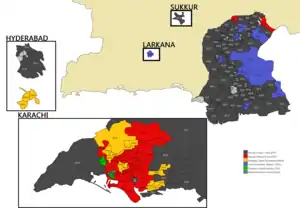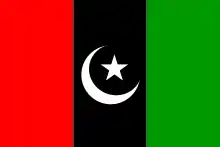2018 Sindh provincial election
Provincial elections were held in Sindh on 25 July 2018 to elect the members of the 13th Provincial Assembly of Sindh.[2][3]
| |||||||||||||||||||||||||||||||||
All 168 seats in the Provincial Assembly 85 seats needed for a majority | |||||||||||||||||||||||||||||||||
|---|---|---|---|---|---|---|---|---|---|---|---|---|---|---|---|---|---|---|---|---|---|---|---|---|---|---|---|---|---|---|---|---|---|
| Opinion polls | |||||||||||||||||||||||||||||||||
| Turnout | 48.11%( | ||||||||||||||||||||||||||||||||
| |||||||||||||||||||||||||||||||||
 Map of Sindh showing Assembly Constituencies and winning Parties | |||||||||||||||||||||||||||||||||
| |||||||||||||||||||||||||||||||||
Background
Following the 2013 elections, despite a significant drop in vote share, the left-wing Pakistan Peoples Party remained the largest party in the assembly and held a comfortable majority with 91 seats. They were followed by the secularist, Muhajir-centric, Muttahida Qaumi Movement, which repeated its 2008 exploits, by securing 51 seats. New additions into the assembly included Pakistan Tehreek-e-Insaf, a welfarist, anti-establishment party led by former cricketer Imran Khan, who emerged as the second largest party in Karachi and gained 4 seats. Meanwhile, Pakistan Muslim League (F), PPP's perennial rival in Interior Sindh, held 11 seats.
Following the elections for the slot of chief ministership, Pakistan Peoples Party was easily able to form a government in Sindh for the ninth time in its existence.[4] Party veteran Qaim Ali Shah was elected in the role of provincial chief minister for the third time in his career, and remained at the position until 2016 when he stepped down and was replaced by Syed Murad Ali Shah.[5]
MQM Splits
During this tenure, MQM ceased to exist as single party due to internal rifts in the wake of the party's leader, Altaf Hussain, giving a controversial speech in August, 2016.[6] It split into MQM-Pakistan and MQM-London, the former in control of Farooq Sattar, while the latter managed by Hussain, who is in self-imposed exile in London since 1991.[7]
Meanwhile, Mustafa Kamal's nascent Pak Sarzameen Party chipped away at MQM-P members.[8] Kamal himself being a former MQM stalwart and erstwhile Mayor of Karachi, who formed the PSP on 23 March 2016.[9]
Further still, in the lead up to 2018 Senate elections, the MQM-P faction saw another split - into Sattar's MQM-PIB and Aamir Khan's MQM-Bahadruabad. The reason for the split being grievances over the allotment of Senate tickets.[10]
Results
| Party | Votes | % | Seats[11] | +/- | ||||
|---|---|---|---|---|---|---|---|---|
| General | Women | Minorities | Total | |||||
| Pakistan Peoples Party | 3,853,081 | 77 | 17 | 5 | 99 | |||
| Pakistan Tehreek-e-Insaf | 1,435,813 | 23 | 5 | 2 | 30 | |||
| Muttahida Qaumi Movement Pakistan | 773,951 | 15 | 4 | 1 | 20 | |||
| Grand Democratic Alliance | 1,479,472 | 9 | 4 | 1 | 14 | new party | ||
| Tehreek-i-Labbaik Pakistan | 414,701 | 2 | 1 | 3 | new party | |||
| Muttahida Majlis-e-Amal | 611,402 | 1 | 1 | |||||
| Postponed | 1 | 1 | ||||||
| Invalid/blank votes | – | – | – | – | – | – | ||
| Total | 100 | 128 | 31 | 9 | 168 | 0 | ||
| Registered voters / turnout | – | – | – | – | – | |||
| Source:[12] | ||||||||
election postponed at ps-94 after the death of MQM-P incumbent
References
- "General Elections 2018 - Results Management System". www.ecp.gov.pk. Retrieved 2018-07-26.
- "General polls 2018 would be held on July 25: sources". Dunya News. 22 May 2018.
- Samaa Web Desk. "Govt to complete its term; elections to be held in July 2018: PM".
- From the Newspaper. "The election score". Dawn News.
- "Murad Ali Shah takes oath as Sindh CM". Dawn. 29 July 2016.
- Zaidi, Qurat-ul-Ain (24 August 2016). "Analyzing Altaf Hussain's speech – Is this the end for MQM?". The Nation.
- Ashraf, Zubair (15 October 2017). "Farooq Sattar's MQM struggles to step out of Altaf's shadow". The Express Tribune.
- Mahmood, Aisha (29 March 2018). "Another MQM-P's lawmaker jumps ship to Pak Sarzameen Party". Business Recorder.
- Suria, Ammar (21 June 2016). "Pak Sarzameen Party announces party structure, says it's growing rapidly". The Express Tribune.
- Raza, Muhammad (19 February 2018). "MQM split: Rabita Committee withdraws Farooq Sattar's nominees for Senate elections". Dawn.
- https://www.geo.tv/latest/207084-pti-tally-at-158-as-ecp-announces-reserved-na-seats-for-women-minorities
- https://www.thenews.com.pk/latest/347016-election-results-2018-party-positions-in-punjab-sindh-kp-balochistan-assemblies

.svg.png.webp)
